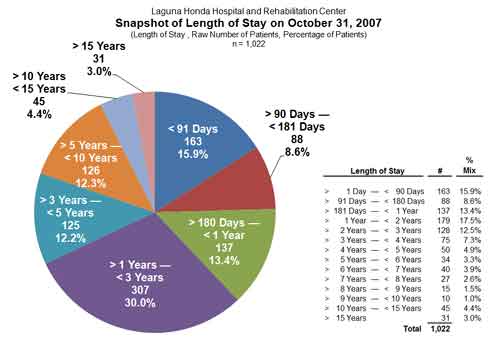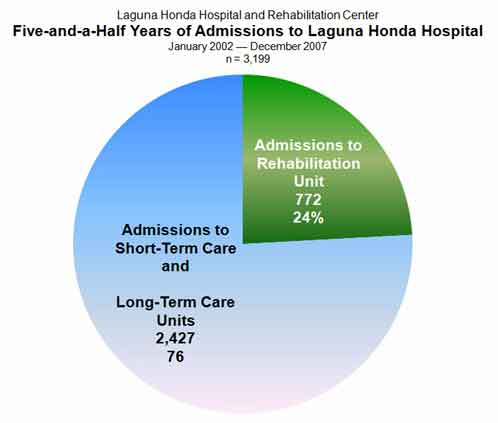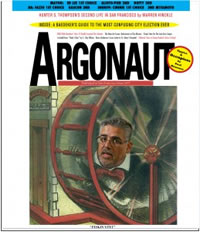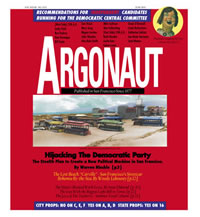
An early San Francisco Alms House — from The Annals of SanFrancisco, 1855
Supervisors Vote Would Doom Venerated Hospital as Home of Last Resort For the City’s Elderly Poor
Board Puts Off Final Action, Schedules to Again Reconsider Vote Next Week
Elsband, Heeding West of Twin Peaks Outrage, Succeeds in Delaying Tactic; Daly Plays The Reasonable Card, Questions Why Laguna Honda Should Be Downgraded to 720 Beds
AT ISSUE: TRASHING THE WILL OF THE VOTERS
San Francisco Senior Citizens In Need Would Be Increasingly Sent to Nursing Homes Outside The City; As Elderly Population Grows, The Beds for Them Would Be Gone
By Patrick Monette-Shaw
When, and if, the rebuilt Laguna Honda Hospital and Rehabilitation Center opens on schedule in late 2009, a light will have gone out in San Francisco — Spanish for St. Francis,the patron saint of the city — with extinguishing help from the San Francisco Board of Supervisors. St. Francis of Assisi, co-founder of the Franciscan Order that focused on providing care for the poor and sick, would himself be sickened to learn that Laguna Honda will undoubtedly open with far fewer beds than originally approved by the voters.
The exact number of beds the Supervisors will settle for will not be known until next week. Supervisors Elsbern and Daly objected to the low mark of 720 beds contained in an agreement originally approved by the City Attorney. In a closed session of the Board last week, the Supervisors sent the issue back to the drawing board for a second time, again asking the City Attorney to come up with a better number. A final vote is now scheduled for next Tuesday.In 1999, voters were assured that if they passed a $299 million bond measure to rebuild Laguna Honda Hospital, that it would be rebuilt with all 1,200 beds for elderly and disabled medically indigent San Franciscans who need long-term care.
Prominent City fathers and mothers — ranging from then-Mayor Willie Brown, to the Director of Public Mitch Katz, to then-City Attorney Louise Rene, to Senator Dianne Feinstein — repeatedly assured voters Laguna Honda’s historic mission would be preserved.
For more than a hundred years, Laguna Honda first served as an alms house for the poor and chronically ill, and for sixty years, since 1950, has served as both a Rehabilitation Center and a skilled nursing facility providing long-term care to indigent San Franciscans.
But in October 2006, six residents of Laguna Honda hospital joined as Plaintiffs in the Chambers vs. City and County of San Francisco, alleging that they were being improperly institutionalized at Laguna Honda, claiming that the City was not doing enough to place residents into the “most integrated setting appropriate to their needs.â€
That claim flies in the face of reason, and statistics.
A document issued a month later, in November 2006 — Current Levels of DPH Community Placement [Options] for Single Adult’s — by the San Francisco Department of Public Health documents that DPH manages 8,259 community-based placement locations. Elsewhere, the Mayor’s Office of Housing indicated that another 1,844 units were either under construction, had been completed, or are in pre-construction planning, for a total of 10,103 placement options.
However, if all 1200 beds at Laguna Honda are not constructed, the Department of Public Health will only have 863 “institutional†skilled nursing beds in which to place patients needing long-term nursing care. This is far shot of the mark as the city’s elderly population grows. 
 Pie Charts by Patrick Monnette-Shaw from Department of Public Health data.
Pie Charts by Patrick Monnette-Shaw from Department of Public Health data.
In 1999, the Board of Supervisors adopted resolution #336-99, authored by then Supervisors Sue Bierman and Mark Leno, restating San Francisco’s commitment to “developing sufficient institutional care, in addition to developing [community-based] alternatives to institutional care for seniors and people with disabilities.â€The Chambers settlement that the myopic San Francisco’s Board of Supervisors approved in February violates both the Board’s Bierman-Leno resolution and the will of the voters who voted in November of 1999 for a bond issue to rebuild Laguna Honda primarily as a home for the city’s elderly poor. On second reading, the Board declined to approve the agreement sent to them by the City Attorney.
The Supervisors original approval – now being reconsidered – meant that there would be an insufficient level of skilled nursing beds to meet current and future needs of the traditional Laguna Honda population – San Franciscans keep getting older, and poorer, and Laguna Honda will no longer be the place with room at the inn.
At the Supervisors meeting last month, a rear guard action led by Supervisor Sean Elsbrend, with a surprising assist from Supervisor Christ Daly, who reversed his original vote for the settlement, won a cooling off period before a second vote. Elsbrend was reacting to his West of Twin Peaks constituents’ anger that the bed size of Laguna Honda would be reduced by supervisory dictate, and Daly suggested that there should be a negotiated way to satisfy the neighborhood nonprofits without violating the will of the voters that Laguna Honda be rebuilt at its original bed level.
Extended Background:
Laguna Honda as the city has known and loved it has been shafted by the budgetary problems at the Department of Public Health – Public Health Chief Mitch Katz a few years ago began dumping troublesome psych patients at Laguna Honda where the staff was not prepared to treat them, and violent incidents ensued. At the same time, a lobbying effort by off-site non-profit groups seeking to grab of share of the social security money the elderly bring with them to Laguna Honda took hold, resulting in the Chambers lawsuit.
After the Chambers Plaintiffs filed their First Amended Complaint regarding Laguna Honda Hospital in October 2006, the Court issued on February 1, 2007 a “Joint Case Management†document outlining a time line for how theChambers case would be heard. It proposed that discovery was scheduled to run through May 30, 2008; expert discovery would be completed by September 12, 2008; a hearing on dispositive motions would be held on December 18, 2008 and an alternative dispute resolution process would be completed by January 2009. The document stipulated the Chambers Plaintiffs wanted to take depositions from 40 witnesses, and the City, as Defendant, wanted to take depositions from 33 witnesses.
But fast tracking to one year later, Deputy City James Emory answered a public
records request on February 8, 2008 stating that no depositions whatsoever had
been taken at all.
The city was dragging its feet.
The Joint Case Management agreement then opted to engage in settlement negotiations in the absence of taking depositions, and the settlement agreement document was rushed through by negotiating the settlement terms “before Defendant makes any commitment of funding to construct a fourth building.†As early as February 2007, the City appears to have caved in to turning out the lights of the 420-bed West Tower that is now on hold, reducing Laguna Honda in the process to only 780 of the planned 1,200 beds.
The Joint Case Management document goes a long way towards explaining how the City Attorney’s office did not adequately represent residents at Laguna Honda who chose to stay there – the traditional Laguna Honda resident who wishes to opt out of the settlement agreement.
Rather than litigating and having the facts and truth about Laguna Honda be heard fairly before a judge at trial, the City in effect caved in and agreed to “negotiate†a settlement agreement. A lousy job of negotiating seems to have occurred considering: The City of St. Francis is projected to have a deficit of 3,000 to 4,000 skilled nursing beds just 12 short years from now, in the year 2020, just as San Francisco will have 10,000 people over the age of 85 who will have Alzheimer’s, many of whom will eventually need skilled nursing level of care.
In November 2007, the proposed Chambers settlement agreement was suddenly made public. The agreement, approved by the Supervisors on first reading and now subject to a revote, places a cap of 780 beds at Laguna Honda, and also stipulates that Laguna Honda’s mission will be for 90-day short-stay and rehabilitation patients; the agreement is at best ambiguous about Laguna Honda’s historical mission of providing long-term care.
Supervisor Chris Daly recently expressed concern about the flight of African American’s from San Francisco:
“One may choose to leave San Francisco, but when it’s not a choice, when you
are forced to leave, and you would prefer to stay — your family is here, your
friends are here, you have neighbors, you have a community — and when you are
forced out and you are displaced, that is a shame. And in a city that prides
itself on being forward-thinking and progressive and open to diversity, we gotta
do better.â€
— Supervisor Chris Daly, Bayview Newspaper, February 6, 2008
The same problem exists with the Chambers settlement agreement as originally approved by a majority of the Board of Supervisors.
It will force hundreds of elderly and disabled San Franciscans to leave our City, since there are already an insufficient number of skilled nursing beds in San Francisco.
Although, the Department of Public Health first claimed it had begun negotiations with out-of-county service providers in order to find discharge locations for Laguna Honda residents, another recent public records request revealed that there “are no records responsive†to the request for contracts being negotiated to provide skilled nursing care in other counties.
Simply dumping our elderly into out-of-county facilities, and displacing them from their friends and family, is not what I would call “San Francisco values.â€Caring for San Franciscans in this city was what Laguna Honda was about, and what the voters wanted to continue.
It is of interest that The Board of Supervisors February 12 agenda failed to include any of the material terms of the Chambers settlement agreement, as required by the City’s Sunshine Ordinance that stipulates any legal settlements the City proposes entering into must disclose the material terms within the agenda item notice. And the ordinance the Board of Supervisors considered to accept the Chambers settlement also failed to fully disclose the material terms of the settlement – there is no notice that Laguna Honda’s decades-long mission to provide long-term skilled nursing care for those who chose to receive it at Laguna Honda was removed. The Chambers settlement dictated that Laguna Honda’s mission would be for 90-day, short- term care and rehabilitation – and nowhere in the original settlement language, is it mentioned that Laguna Honda will continue providing long-term care, and that the original bed level approved by the voters will be maintained.
The settlement as at first approved by the Supervisors has no provision to protect long term Laguna Honda patients who chose to receive skilled nursing care at Laguna Honda to “opt out†from being forced to be a class member to the Chambers settlement agreement; they will be forced by the Court to abide by any rulings the Court orders.During the February 12 Board of Supervisors meeting Supervisor Sean Elsbernd questioned Deputy City Attorney James Emery about whether the proposed Chambers settlement agreement will restrict Laguna Honda to only 780 beds. Emery responded, in effect, that the plain language really doesn’t mean what it plainly says. The City is attempting to use spin control that the term “upon completion†of the current construction, the 780 bed limit will not exist in perpetuity, and the City will be permitted to later build the remaining 420 beds if it finds money to do so. Fat chance.
Elsbernd also grilled Emery regarding whether the Chambers stipulation that narrows Laguna Honda’s mission to provide 90-day short-term care and rehabilitation services will prevent Laguna Honda for caring for long-term care patients. Emery denied that long-term care patients would be excluded. However, they clearly will be excluded.
Shamefully, the Board 8-2 voted on February 12 to accept the Chambers settlement on its first reading, with Supervisors Chris Daly and Ross Mirkarini dissenting against passing the ordinance on first reading. Supervisor Alioto-Pier, for her part, departed the Board chambers just before the vote; she did not go on record, being found voting “absent†when it came to turning out Laguna Honda’s lights.
Testimony I presented to the Board of Supervisors and the Health Commission shows that a statistical snapshot of Laguna Honda residents – recorded on October 31, 2007 – illustrates that only 16 percent of then-current residents would qualify for retention if the Chambers settlement proposal restrictions regarding 90-day short-term care were to be enforced.
During the past five-and-a-half years between January 2002 and December 2007, only 24 percent of the 3,199 admissions to Laguna Honda were to its rehabilitation units. Obviously, 84 percent of LHH’s residents would not meet the 90-day short-stay provisions of the Chambers settlement.It would be a simple matter for the Board of Supervisors to amend the Chambers language to specify in writing that Laguna Honda can continue to provide long-term care. If the Supervisors do not add that language into the settlement on second reading of the ordinance, the Supervisors will be throwing the switch to turn out the lights to 420 beds, and also turning out the lights to long-term care.
Both problems could easily be corrected with a stroke of the Board’s pen, and by introducing an “opt out†mechanism for Laguna Honda residents who chose to stay.
Shamefully, there has been an almost complete media blackout over the ramifications of the proposed Chambers settlement agreement Not one drop of ink has been spared by the City’s major dailies, neighborhood newspapers, or by alternative weekly newspapers in covering the shameful “Laguna-Honda’s-safety-net-lights-are-about-to-go-out†story.
The Board of Supervisors have an opportunity to remedy the situation by not voting to turn out the lights to 420 of St. Francis of Assisi’s beds.Monette-Shaw is a healthcare and skilled nursing advocate.For additional information, visit www.stopLHHdownsize.com


















1 response so far ↓
1 maxxxmagician // Nov 8, 2010 at 4:16 am
🙂
You must log in to post a comment.